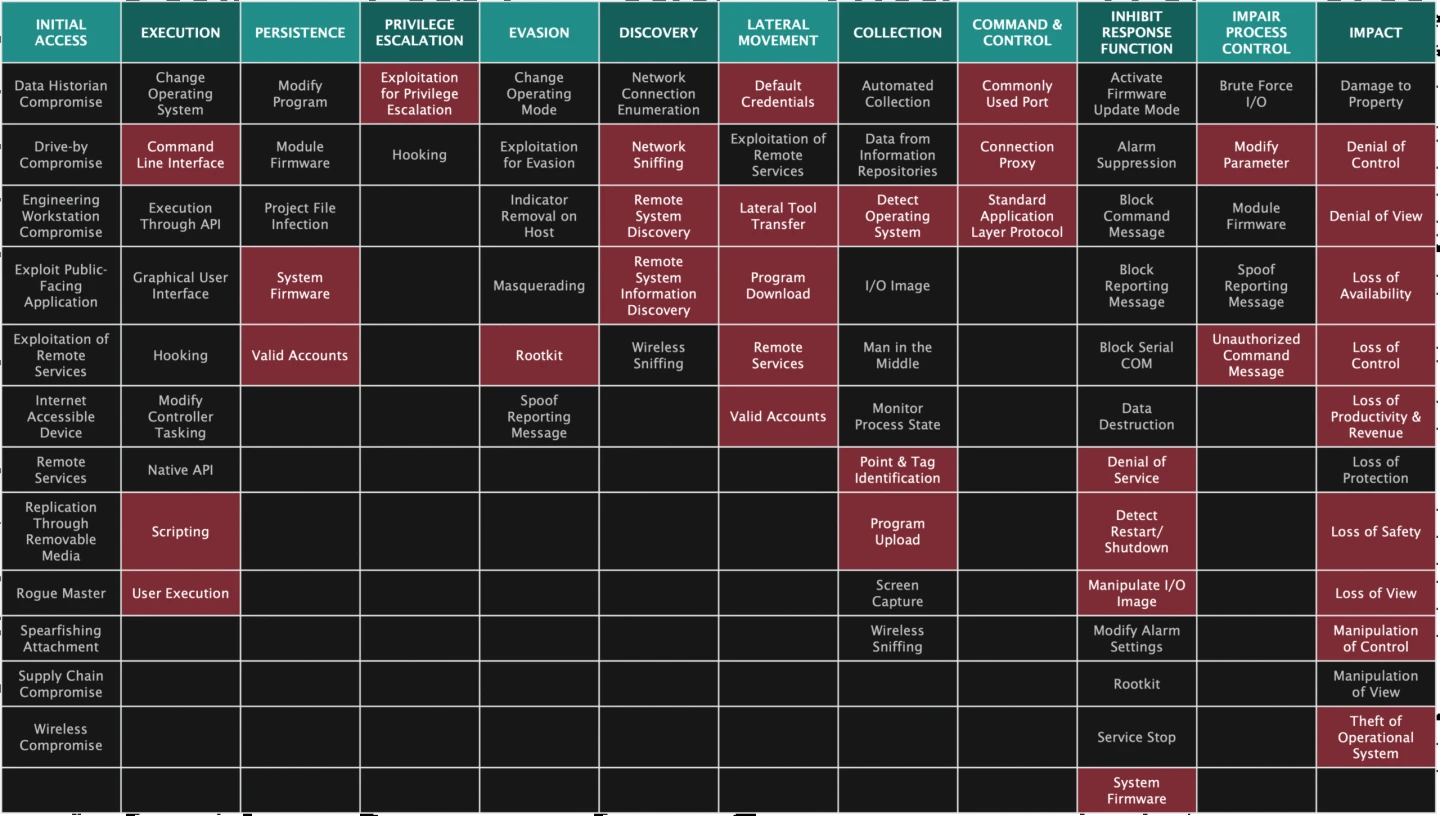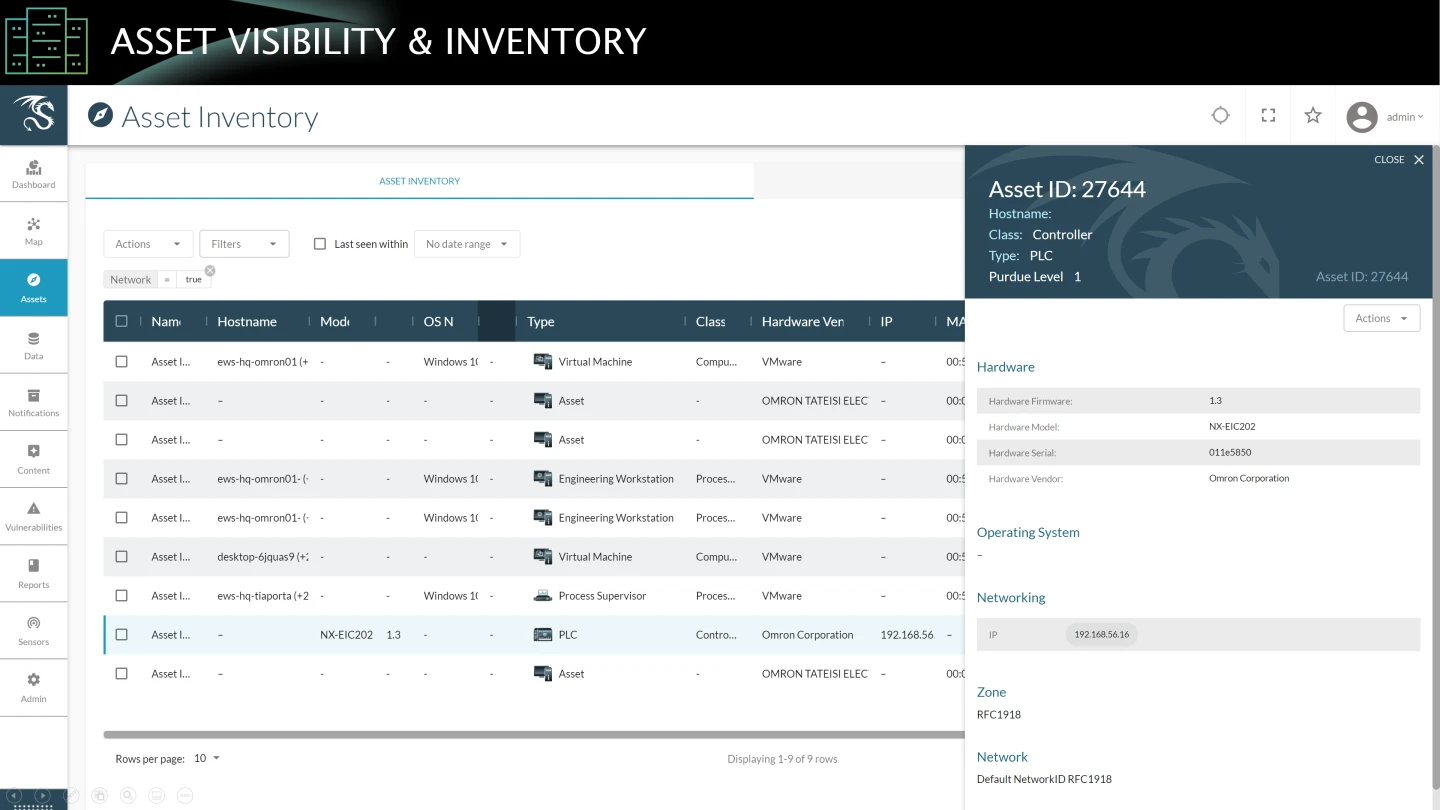As referenced in the original blog post, “CHERNOVITE’s PIPEDREAM Malware Targeting Industrial Control Systems,” and the detailed whitepaper, PIPEDREAM is the seventh known ICS-specific malware. Developed by the Activity Group (AG) which Dragos has designated as CHERNOVITE, PIPEDREAM malware can disrupt, degrade, and potentially destroy industrial environments and processes.
PIPEDREAM can manipulate a wide variety of programmable logic controllers (PLCs) and other industrial equipment including Omron and Schneider Electric hardware. It can also execute attacks against the ubiquitous industrial technologies CODESYS, Modbus, and OPC UA. It is believed to have the potential to execute at least 38 percent of known ICS attack techniques and 83 percent of known ICS attack tactics.1 PIPEDREAM impacts its targets by way of five integrated utilities Dragos has labeled: EVILSCHOLAR, BADOMEN, MOUSEHOLE, DUSTTUNNEL, and LAZYCARGO.
[PIPEDREAM] is believed to have the potential to enable at least 38 percent of known ICS attack techniques and 83 percent of known ICS attack tactics.
In addition to the Dragos Intel blog and whitepaper referenced above, further technical details on PIPEDREAM are available to customers with a Dragos WorldView Threat Intelligence Subscription. A companion blog from the Dragos Global Services team provides guidance for review of incident response plans, activating components of those plans to proactively address impacted assets, manual search methods to look for potential malicious behaviors for customers without the Dragos Platform, as well as a reminder for “best practices” for building an effective ICS/OT cybersecurity program.
This blog post provides Dragos Platform customers with summary guidance for how to leverage the Platform to quickly identify and mitigate risk from PIPEDREAM. A more detailed version and instructions about the new dashboard is available in the Dragos customer portal.
General Detections: These are general detections that would fire in the Dragos Platform, covering most related threats. They will fire but are not specific to CHERNOVITE:
- Compiled Python Executable Yara Rules, Compiled Python Transfer, Compiled Python Transfer to OT Asset
- Windows Python Compiled Executable
- Command and Control after Exploitable File Download; Windows cmd.exe file download; File Downloads, File Download then New Comms
- Command and Control after Exploitable File Download; Windows cmd.exe file download; File Downloads, File Download then New Comms
- Windows Python Execution with Network Connection
- C2 Backdoor via SSL
Specific Detections Related to CHERNOVITE
| Dragos Platform Detection(s) | MITRE ATT&CK for ICS Technique |
| Compiled Python Transfer, C2 After File Download | T1544 Remote File Copy; T1105 Ingress Tool Transfer |
| Windows Python Execution with Network Connection | T1059 Command and Scripting Interpreter |
| WinRM Enable, Windows Lateral Movement | T1047 Windows Management Instrumentation |
| Omron PLC Hardcoded Telnet Username and Password Used | T1552.001 Unsecured Credentials: Credentials in Files |
| Omron PLC Hardcoded HTTP Username Used | T1552.001 Unsecured Credentials: Credentials in Files |
| Omron Shell Unauthorized PLC Manipulation | T0868 Detect Operating Mode |
| Omron Shell Unauthorized PLC Manipulation | T0888 Remote System Information Discovery |
| Omron Shell Unauthorized PLC Manipulation | T1573 Encrypted Channel |
| Omron Shell Unauthorized PLC Manipulation | T1021 Remote Services |
| Omron Shell Unauthorized PLC Manipulation | T1544 Remote File Copy |
| Authentication Brute Force Attempts | T1110 Brute Force |
| Schneider Modicon Modbus Denial of Service | T0814 Denial of Service |
| Schneider Electric PLC Corruption Framework | T0869 Standard Application Layer Protocol |
| Schneider Electric PLC Corruption Framework | T1078 Valid Accounts |
| AsRock SignSploit, File Downloads | T1544 Remote File Copy |
| Scan Sequential, Port Sweep ICS Ports | T1046 Network Service Scanning |
| OPC UA Python Library Initial Connection | T0869 Standard Application Layer Protocol |
If they haven’t yet applied KP-2022-004, Dragos Platform customers can start manual hunts for potential malicious activity in their environments using the information included in Dragos Worldview Threat Report TR-2022-10. Identifiers for potential target devices including manufacturers, models, ports, and URI strings are included along with information contained in AA-2022-25.
Dragos continues to perform analysis of PIPEDREAM and several additional detections are under development for future Dragos Platform Knowledge Pack (KP) releases. These will be announced when available and included in release update communications.
- Deploy the latest Knowledge Pack: Knowledge Pack KP-2022-004 and above contains detections for EVILSCHOLAR, BADOMEN, MOUSEHOLE, and LAZYCARGO
- Identify impacted assets: Access your Asset Inventory and search for Schneider PLCs, Omron PLCs, and OPC UA Servers
- Look for current potential malicious behavior: Review your dashboards to determine if any general detections have been triggered (see above for both general and specific detections that could be triggered)
- Perform a retrospective search for potential malicious behavior: across your SiteStore forensics for signs of past activity involving this malware. See above for “Retrospective Search for Potential Malware Activity”
Get the complete analysis Read the complete analysis on CHERNOVITE and the PIPEDREAM malware targeting ICS, with defensive recommendations on what to do to protect against possible cyber attack.
References
1 As measured against the MITRE ATT&CK for ICS malicious behavior matrix.



